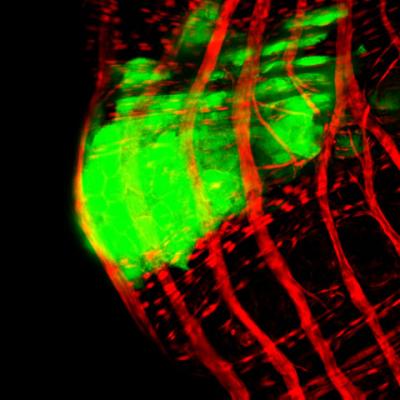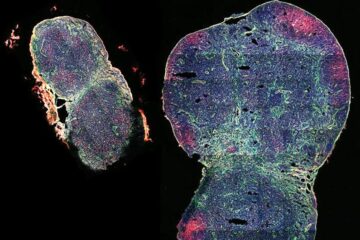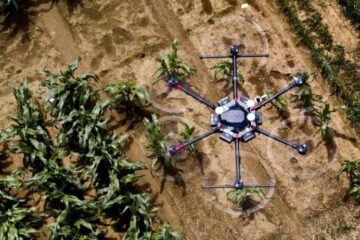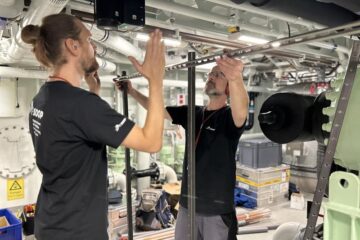Fruit flies reveal features of human intestinal cancer

The image shows a close up of a tumor-like growth (green fluorescence) in the gut of a fruit fly. Credit: Andreu Casali
The scientists believe a related system may be at work in humans during the progression of colorectal cancer due to the observation of similar genes and genetic interactions in cultured colorectal cancer cells. The results are reported in the journal EMBO Reports.
Colorectal cancer leads to more than half a million deaths worldwide each year. The disease originates in the epithelial cells of the gastrointestinal track mainly due to aberrations in the molecular signaling activities of cells.
“We have been able to use flies as a model system to study molecular events that are very similar to the steps that take place in colorectal cancer in humans and we have been able to use this system to identify new genetic regulations relevant to human disease,” says Andreu Casali, lead author of the study and a research associate at the Institute for Research in Biomedicine in Barcelona.
Mutations in two signalling pathways – the Wnt and EGFR/Ras pathways – are known to activate tumour-like growths in the intestines of fruit flies. In Drosophila, the researchers were able to show that activity of the Decapentaplegic (Dpp) pathway suppresses the growth of these intestinal tumours but that this suppression is counteracted by the Mirror transcription factor, a specific type of Irx transcription factor.
In humans, the equivalent of Dpp is bone morphogenetic protein, a component of the Transforming Growth Factor-beta signaling pathway. “Our results in fruit flies lead us to think that Irx transcription factors such as Mirror might play a similar role in flies and humans, namely reducing the ability of tumour cells to respond to Transforming Growth Factor-beta in the transition from a benign adenoma to more aggressive carcinoma in the human colon,” says Casali.
Transforming Growth Factor-beta typically acts as a brake on cell growth in the signaling system of the cell. Therefore Irx transcription factors like Mirror may be responsible under certain conditions for favouring cell growth and leading to cell proliferation that is consistent with the hallmarks of cancer in flies and humans. It may now be possible to test possible interventions for these cancer-like processes using the fly as a model system.
###
Iro/Irx transcription factors negatively regulate Dpp/TGF-beta pathway activity during intestinal tumorigenesis
Òscar Martorell, Francisco M. Barriga, Anna Merlos-Suárez, Camille Stephan-Otto Attolini, Jordi Casanova, Eduard Batlle, Elena Sancho and Andreu Casali
Read the paper: The paper will be available on-line at 10.00 am Central European Time at embor.embopress.org. Advance copies available upon request to barry.whyte@embo.org
Media Contacts
Barry Whyte
Head | Public Relations and Communications
barry.whyte@embo.org
Nonia Pariente
Senior Editor, EMBO reports
Tel: +49 6221 8891 305
pariente@embo.org
About EMBO
EMBO is an organization of more than 1700 leading researchers that promotes excellence in the life sciences. The major goals of the organization are to support talented researchers at all stages of their careers, stimulate the exchange of scientific information, and help build a European research environment where scientists can achieve their best work.
EMBO helps young scientists to advance their research, promote their international reputations and ensure their mobility. Courses, workshops, conferences and scientific journals disseminate the latest research and offer training in techniques to maintain high standards of excellence in research practice. EMBO helps to shape science and research policy by seeking input and feedback from our community and by following closely the trends in science in Europe.
For more information: http://www.embo.org
Media Contact
All latest news from the category: Life Sciences and Chemistry
Articles and reports from the Life Sciences and chemistry area deal with applied and basic research into modern biology, chemistry and human medicine.
Valuable information can be found on a range of life sciences fields including bacteriology, biochemistry, bionics, bioinformatics, biophysics, biotechnology, genetics, geobotany, human biology, marine biology, microbiology, molecular biology, cellular biology, zoology, bioinorganic chemistry, microchemistry and environmental chemistry.
Newest articles

Expanding a lymph node, boosting a vaccine
A biomaterial vaccine enhances and sustains lymph node expansion following vaccination, boosting anti-tumor immunity in an animal model. Each one of us has around 600 lymph nodes (LNs) – small,…

AI to Make Crop Production More Sustainable
Drones monitoring fields for weeds and robots targeting and treating crop diseases may sound like science fiction but is actually happening already, at least on some experimental farms. Researchers from…

Cruise Ship as Data Collector
New Approaches in Ocean Observation… Scientific research – not only confined to dedicated research vessels but also from non-scientific vessels and marine infrastructures. This is one of the ideas promoted…





















